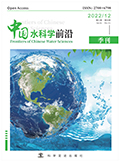

西藏位于我国西南边疆地区, 被誉为“世界屋脊”。西藏不仅拥有着丰富的水资源, 更被视为国家重要的能源储备基地。然而, 在全球范围内, 西藏也是少数几个面临水资源短缺挑战的地方之一。为了应对这一挑战, 必须深入理解和把握生态文明理念的内涵、本质特征和基本要求, 结合西藏当前的水资源状况, 分析存在的问题, 结合生态文明理念提出改进措施, 以推动西藏地区水资源的可持续开发与管理。作生态文明建设的核心要素之一, 水资源的保护与合理利用, 直接关系到生态环境的稳定与人类社会的可持续发展。因此, 必须从源头上遏制水污染问题, 加强水环境的保护。针对西藏地区水资源短缺的问题, 需要科学规划和管理水资源, 合理调配水资源, 提高水资源利用效率。同时, 还需要借助现代科技手段, 如遥感技术、大数据分析等, 对西藏地区的水资源进行实时监控和管理, 以更好地应对水资源短缺的挑战。最后, 必须坚持人与自然和谐共生的理念, 尊重自然、顺应自然、保护自然, 以达到人与水、人与自然和谐共生的目标。总的来说, 通过对西藏地区水资源的深入研究, 可以更好地理解生态文明理念的内涵、本质特征和基本要求, 从而提出更科学、更合理的改进措施, 以推动西藏地区水资源的可持续开发与管理, 实现人与自然和谐共生。
Tibet, known as the “roof of the world” in China's southwest border region, is not only rich in water resources, but also regarded as an important national energy reserve base. However, on a global scale, Tibet is also one of the few places in the world that faces the challenge of water scarcity. In order to cope with this challenge, it is necessary to deeply understand and grasp the connotation, essential characteristics and basic requirements of the concept of ecological civilization, and on this basis, combined with the current situation of water resources in Tibet, analyze the existing problems and put forward improvement measures in the light of the concept of ecological civilization, to promote the sustainable development and management of water resources in Tibet. As one of the core elements of ecological civilization construction, the protection and rational utilization of water resources are directly related to the stability of the ecological environment and the sustainable development of human society. Therefore, it is necessary to curb water pollution from the source and strengthen the protection of water environment. In view of the shortage of water resources in Tibet, it is necessary to scientifically plan and manage water resources, rationally allocate water resources, and improve the efficiency of water resources utilization. At the same time, it is also necessary to use modern scientific and technological means, such as remote sensing technology and big data analysis, to carry out real-time monitoring and management of water resources in Tibet to better cope with the challenge of water shortage. Finally, it is necessary to adhere to the concept of harmonious coexistence between man and nature, respect nature, adapt to nature, and protect nature, in order to achieve the goal of harmonious coexistence between man and water, man and nature. In general, through the in-depth study of water resources in Tibet, we can better understand the connotation, essential characteristics and basic requirements of the concept of ecological civilization, so as to propose more scientific and reasonable improvement measures to promote the sustainable development and management of water resources in Tibet and to realize the harmonious coexistence between human beings and nature.